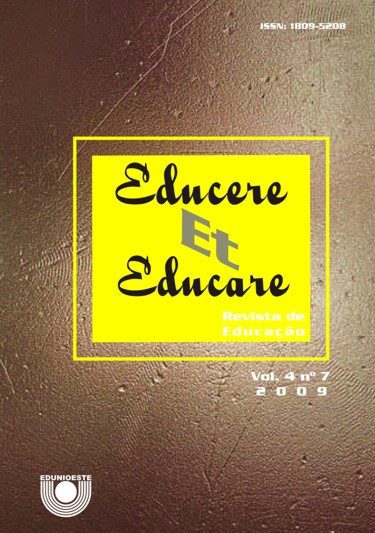A PEDAGOGIA HUMANISTA DE SÃO JOÃO DA CRUZ (1542-1591) NO SÉCULO XVI
DOI:
https://doi.org/10.17648/educare.v4i7.3237Palavras-chave:
São João da Cruz, Escolas Elementares, Humanismo Espanhol, Idéias Pedagógicas, Tempos Modernos.Resumo
O objetivo deste texto é discutir as idéias pedagógicas humanistas na Espanha doséculo XVI por meio da análise da configuração do pensamento de São João da Cruz (1542-
1591), religioso da Ordem dos Carmelitas Descalços. As idéias pedagógicas forjadas nesse
período na Espanha fizeram parte da atividade formativa defendida por ele para os noviços e
para os alunos das escolas elementares mantidas pela Ordem dos Carmelitas Descalços. Essas
escolas elementares contribuíram de maneira significativa para a difusão das idéias
pedagógicas humanistas. As escolas elementares de responsabilidade dos religiosos das
Ordens Mendicantes, entre elas as dos Carmelitas Descalços, foram iniciativas decisivas em
relação à educação escolar, à formação em leitura, escrita e cálculo, em língua vernácula,
visto que criaram novos modelos de instrução e de educação elementar no início da
Modernidade na Espanha, de onde se expandiu para as novas terras recém conquistadas. Na
reforma do Carmelo feita no século XVI, São João da Cruz e seus discípulos realizaram um
grande esforço pedagógico para a expansão da leitura e da escrita nas comunidades onde se
estabeleceram. A pedagogia presente nos textos de São João da Cruz apresenta características
pedagógicas como, por exemplo, a afetividade como expressão da educação, da religiosidade
e também da produção do conhecimento.
Downloads
Publicado
01-01-2000
Como Citar
TOLEDO, C. de A. A. de; BARBOZA, M. A. A PEDAGOGIA HUMANISTA DE SÃO JOÃO DA CRUZ (1542-1591) NO SÉCULO XVI. Educere et Educare, [S. l.], v. 4, n. 7, p. p. 47–65, 2000. DOI: 10.17648/educare.v4i7.3237. Disponível em: https://saber.unioeste.br/index.php/educereeteducare/article/view/3237. Acesso em: 25 out. 2025.
Edição
Seção
Núcleo Temático: História, Sociedade e Educação
Licença
Aviso de Direito Autoral Creative Commons
Política para Periódicos de Acesso Livre
Autores que publicam nesta revista concordam com os seguintes termos:
1. Autores mantém os direitos autorais e concedem à revista o direito de primeira publicação, com o trabalho simultaneamente licenciado sob a Licença Creative Commons Attribution que permite o compartilhamento do trabalho com reconhecimento da autoria e publicação inicial nesta revista.2. Autores têm autorização para assumir contratos adicionais separadamente, para distribuição não-exclusiva da versão do trabalho publicada nesta revista (ex.: publicar em repositório institucional ou como capítulo de livro), com reconhecimento de autoria e publicação inicial nesta revista.
3. Autores têm permissão e são estimulados a publicar e distribuir seu trabalho online (ex.: em repositórios institucionais ou na sua página pessoal) a qualquer ponto antes ou durante o processo editorial, já que isso pode gerar alterações produtivas, bem como aumentar o impacto e a citação do trabalho publicado (Veja O Efeito do Acesso Livre).
Licença Creative Commons
Esta obra está licenciada com uma Licença Creative Commons Atribuição-NãoComercial-CompartilhaIgual 4.0 Internacional, o que permite compartilhar, copiar, distribuir, exibir, reproduzir, a totalidade ou partes desde que não tenha objetivo comercial e sejam citados os autores e a fonte.


